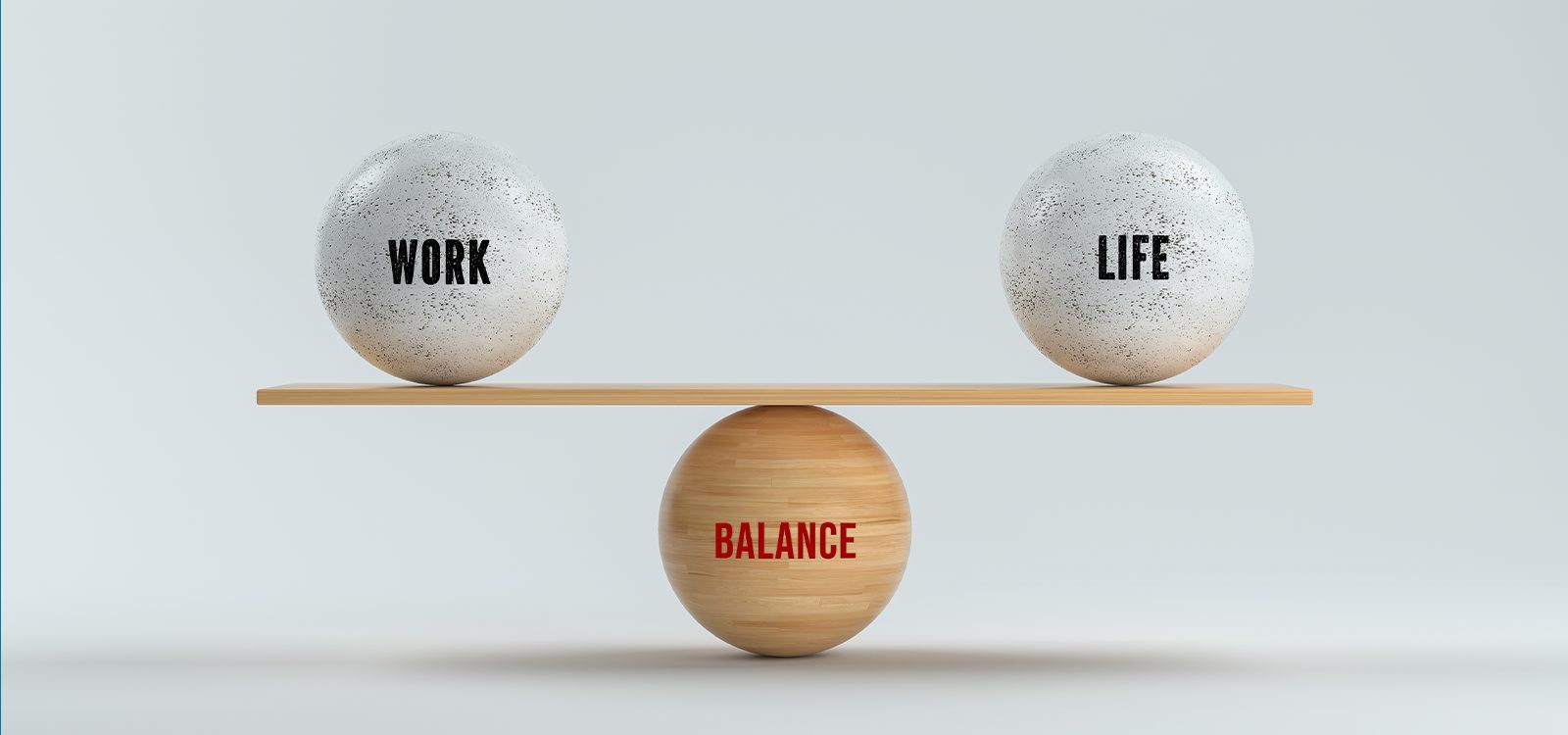
Tips to create a healthy work-life balance
Singer-songwriter, actress and businesswoman Dolly Parton famously said, “Never get so busy making a living that you forget to make a life.” It’s simple and wise advice, but as our careers progress and we take on more responsibility at work (and maybe at home), how do we balance our work and non-work pursuits?
Depending on our values and priorities, ‘work-life balance’ might look different for each of us. Sometimes the balance comes easily and other times it can be a struggle. As a mum of four and a business owner, I have spent most of my career striving for better balance!
Over time I have gained a better idea of what I want in terms of work-life balance and what I need to do to achieve this. Sometimes this involves tactics to keep all the plates spinning during a busy period (e.g. stocking the freezer with healthy meals), and other times it requires a strategic shift in priorities and working arrangements (e.g. ensuring I plan to take time off to recharge).
In my work with actuaries at the early stages of their career, a common question I hear is “how do you maintain work-life balance as you become more senior?”. To answer this, I reflected on my own experience and asked senior actuaries for their top tips.
Defining what work-life balance means to you
Getting clear about and regularly reassessing your priorities can help you keep work and life in better balance.

Martin Mulcare believes that the work-life (or work-family) spectrum is not binary and suggests approaching this challenge holistically. Martin suggests reflecting on what work-life balance means to you:
“What is important to you? What are your values? Everyone is different but typically the list may include family, friends, health, hobbies, business, finances, achievement. Your ‘work’ is a key part of who you are, so ideally it all should fit together.”
Martin suggests including all important commitments – both work and non-work related – in your calendar to remind you of their equal priorities.

Annette King writes down her personal goals at the start of each year to ensure she’s clear about her priorities. She discusses her goals with her family to make sure everyone is on the same page.
“My husband and I try to support each other in our endeavours – for both of us, family is incredibly important and so are our careers. We can’t all do everything all at once, so we agree on the priorities at points in time and then support each other with those goals, as well as handling the curve balls and opportunities that arise along the journey!”

Jennifer Lang agrees that prioritisation is fundamental.
“I have a philosophy of thinking about how much time I have for work first and then working out what my priorities are to fit that time. While I don’t always stick to it, I find the mindset helps me work out what things on my to-do list just aren’t all that important. If I have no hope of fitting something into my 40-50 hours a week of work time, then I need to delegate it, or deal with it in some other way.”

Not everyone wants or needs the same number of working hours in their week. Chris Dolman has worked a four-day week since 2018 and points out work-life balance means different things to different people. He advises the following:
“Decide what you want and do it, without apologies, but also respect others for their choices. I’ve known some workaholics who were actually really happy doing that, and then there are people like me who like to limit work time to make room for other things. Just be honest with yourself about what you want and be unapologetic about doing it.”

Our definition of work-life balance can change over time, and sometimes it is in retrospect that we realise we didn’t always get it right. Douglas Isles shares his experience:
“I think you can put too much emphasis on work. I’ve got better at that balance, but at the same time my kids have got older. So, I think at the point where that balance was critical, I got it wrong. I was too skewed too heavily towards work. As I try and get that balance back, unfortunately they’re getting older, there’s not so many times they want to do things with their dad. But I think the younger you can learn this, the better. If I could appeal to people in their early 30s that if they think about things, try to get that balance in place as early as you can because I think it makes it makes a big difference.”
|
TOP TIP: Know what ‘work-life balance’ means to you and periodically reassess what’s important.
|
Expectations and boundaries
Once you know your priorities, it’s important to set boundaries and manage expectations with those around you to help achieve your planned work-life balance.

Ada Tong and her husband both work and parent two small children. She is very organised and keeps a family Trello board to help everyone stay on track. Ada agrees that ruthless prioritisation should be complemented by clear boundary setting:
“Be very clear with yourself, your work and your family on your boundaries. It is your responsibility to draw and keep those boundaries. Accept that you can’t be everything to everyone and that there’ll always be more you want to do for work and family/life, but that there’s limited time.”
Martin highlights the importance of being aware of expectations. He suggests paying attention to whether the expectations belong to you or someone else:
“If they are your expectations then I suggest taking a breath and questioning your assumption that, now that you are ‘more senior’, you ‘have to’ work longer, harder or be more available. If they are your manager’s expectations, then that may be a challenge. Ideally you would have sought to understand and modify their expectations when you took on the role. If their expectations are now established then they will be harder to shift but well worth attempting in a one-on-one conversation about your values relative to the organisation’s values.”
Chris reminds us that following through with your boundaries and expectations can have consequences, such as missing out on interesting projects or having to say no to new opportunities.
“You need to emotionally deal with this – it’s often hard for high-achieving people to learn to opt-out from things or delegate/redirect interesting things to others, as it’s usually not something we’ve learned to do growing up or in our early career. But you won’t have enough hours in the day to do everything that looks interesting, so learn to be more selective.”
|
TOP TIP: Set boundaries and manage expectations for yourself and those around you.
|
Make a plan but remember your higher objectives

Actuary and father of twins Sam Maitra agrees that being balanced makes you better at work. He also points out that balance isn’t always attainable all the time:
“I also try to remember to be fair to myself, and that balance might not always be achievable every day or week. Make sure wherever your focus, that you are 100% present, otherwise you end up lost in between worlds and both suffer.”

You don’t have to be a parent to find work-life balance difficult! When Genevieve Hayes embarked upon her Master’s degree on top of a full-time management role and all of her life admin tasks (e.g. cooking, cleaning, paying bills and shopping for food) while living on her own, she had to become incredibly strict with how she used her time.
“I had to make every single minute of every single day count. In my work life, I was strict about when I started and finished each day and only worked late when it was absolutely necessary. Outside of work, I gave up pretty much everything that I considered to be non-essential, and studied in every free moment. In the gaps between semesters, I started preparing for the next semester in order to smooth out the workload. Basically, my ‘fun’ was 30 minutes of TV each night before bed.”
So was being super-organised and disciplined worth it?
I don’t regret it, because when I look back on that time, I realise that I have something pretty cool to show for it. So, I suppose it all comes down to: what do you want; how badly do you want it; and how much are you willing to sacrifice in order to get it?”
|
TOP TIP: Apply time management techniques to get everything done but don’t lose sight of the big picture.
|
Tips for leaders
Leaders have a role to play in helping their team members maintain work-life balance through their own modelling and their management approach. I’ve been fortunate to have worked for leaders who understood this and supported the flexibility I needed to juggle my commitments.

Bryce Shepherd believes leaders play an important role in helping their team members achieve balance:
“As leaders, we should have a good handle on time and effort for the work items our teams do. With this in mind, and by being conscious of the boundaries of when members are ‘pushing it’ in a good way or pushing it in a ‘burn-out’ way, we can guide the teams (or members) to get the balance right (i.e., show where acceptable corners can be cut or reprioritised). It requires more effort from the leaders in the beginning of the working relationship but over time that investment pays off in less hands-on involvement and more empowerment over time.”
Bryce reminds us that our day-to-day decisions impact our team: “An example of this is delivery of work items for a deadline. If it’s (due at) 5pm on a Friday, this should be given by lunch or the morning, not at 4:59pm.”
Another senior leader recently told me that she tracks the total working hours of her junior team members, as this provides valuable information about who is overloaded or needs help managing their time.
|
TOP TIP: Leaders can support work-life balance for their team through their management actions.
|
Conclusion
Good work-life balance varies between people and across the life course. To achieve our desired level of work-life balance it is important to reflect on our own work and non-work priorities and goals. Once this is clear, it can help to set boundaries and manage expectations of ourselves and those around us to support our vision of work-life balance.
When things get busy, we can use time management techniques to get things done, but it is important to remember the bigger picture and our key objectives. Life doesn’t always go to plan and sometimes we need to step back to reassess what is important and make changes if necessary.
Finally, great leaders can support the work-life balance of their team members through their actions and behaviour, such as good planning and communication.
What does work-life balance look like to you, and how do you achieve it? Please add a comment with your thoughts below.
CPD: Actuaries Institute Members can claim two CPD points for every hour of reading articles on Actuaries Digital.






